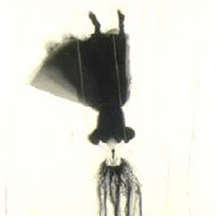
terrible angels
Thursday, December 07, 2006
pomegranates & persephone
Pomegranates are associated with the winter because of the story of Persephone. This is the myth that explains the change of the seasons and hence the passing of time and the concepts of repetition, return and of memory and loss. And sex, naturally. It is not surprising when you look at the fruit that there is a myth in which eating a pomegranate is a metaphor for sexual experience. Indeed, because Persephone eats the seeds of a pomegranate while she is in the underworld she is not allowed to leave. The story continues from there but you can find out what happens for yourself.
There are a number of places on the web where you can read the various versions of the myth. Quick little summaries are nice but keep in mind that the story is far from simple. The original version of the story is a complex poetic work written in Homeric Greek. While the changing of the seasons seems like a basic literary trope, there is little about story that is obvious in its meaning.
The Rape of Persephone -- Homeric Hymn version with links to other translations.
Encyclopaedia Mythica Version -- A shorter summary
Subscribe to:
Post Comments (Atom)




No comments:
Post a Comment